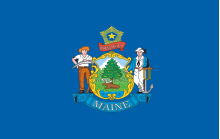Updated: 9/1995
Status: Possibly permitted
Statute
 Maine statute, Title 28-A, Part 3, Subpart 3, Chapter 51, Subchapter II,
Maine statute, Title 28-A, Part 3, Subpart 3, Chapter 51, Subchapter II,
§ 1356 provides that any person not licensed by the state commission who manufactures for sale any liquor, and any person who sells any liquor manufactured by him without a license in the State, commits a Class E crime.
Discussion
Presently no provision, exception, exemption or license exists for the home production of beer in Maine. However it appears that the home production of beer may not violate Maine law if such beer is not produced for sale. Section 1356 requires a license for the manufacture of any liquor for sale. “Liquor” means spirits, wine or malt liquor, or any substance containing liquor, intended for human consumption, which contains more than 1/2 of 1% of alcohol by volume. “Malt liquor” means liquor produced by the fermentation of malt, wholly or partially, or from any malt substitute, which contains 1/2 of 1% of alcohol or more by volume. “Malt liquor” includes, but is not limited to ale, beer, porter and stout. “Malt liquor” includes beverages made with malt liquor, but to which no spirits are added.
Special Provisions
N/A
State Alcohol Beverage Control Agency
- Bureau of Alcoholic Beverages and Lottery Operations
- State House, Station 8
- Augusta, ME 04333
- Phone: 207.289.3721
- Fax: 207.287.4049
Applicable Statutory Material
§ 1. Compliance required; penalty
Any person who purchases, imports, transports, manufactures, possesses or sells alcohol in violation of law commits a Class E crime.
§ 2. Definitions
As used in this Title, unless the context otherwise indicates, the following terms have the following meanings.
1. Agency liquor store. “Agency liquor store” means a person who is licensed by the commission to sell spirits to be consumed off the premises.
2. Alcohol. “Alcohol” means the substance known as ethyl alcohol, hydrated oxide of ethyl or spirit of wine which is commonly produced by the fermentation or distillation of grain, starch, molasses, sugar, potatoes or other substances, and includes all dilutions and mixtures of these substances. Title 17, section 2003-A.
5. Brewer. “Brewer” means a person who produces malt liquor by fermentation of malt, wholly or partially, or from any substitute for malt
11. Distiller. “Distiller” means a person who produces spirits by the process of distillation.
16. Liquor. “Liquor” means spirits, wine or malt liquor, or any substance containing liquor, intended for human consumption, which contains more than 1/2 of 1% of alcohol by volume.
16-A. Low-alcohol spirits product. “Low-alcohol spirits product” means a product containing spirits that has an alcohol content of not more than 4% by volume.
17. Maine farm winery. “Maine farm winery” means a facility that is fermenting, aging and bottling its own wine within the State, not to exceed 50,000 gallons per year.
18. Malt liquor. “Malt liquor” means liquor produced by the fermentation of malt, wholly or partially, or from any malt substitute, which contains 1/2 of 1% of alcohol or more by volume. “Malt liquor” includes, but is not limited to, ale, beer, porter and stout. “Malt liquor” includes beverages made with malt liquor, but to which no spirits are added.
19. Manufacturer. “Manufacturer” means a person who distills, rectifies, brews, ferments, bottles or otherwise produces liquor.
30. Sparkling wine. “Sparkling wine” means carbonated wine.
31. Spirits. “Spirits” means any liquor produced by distillation or, if produced by any other process, strengthened or fortified by the addition of distilled spirits of any kind, including low-alcohol spirits products. “Spirits” includes fortified wine.
36. Wine. “Wine” means any liquor containing not more than 15.5% alcohol by volume which is produced by the fermentation of fruit or other agricultural products containing sugar and to which no spirits are added. “Wine” includes, but is not limited to, wine coolers, table wine, still wine, sparkling wine and champagne, provided that the alcohol content is not above 15.5% by volume.
37. Winery. “Winery” means a facility which ferments, ages and bottles wine.
§ 1356. Illegal Manufacture
1. Illegal manufacture; penalty. Any person not licensed by the commission who manufactures for sale any liquor, and any person who sells any liquor manufactured by him without a license in the State, commits a Class E crime.
Note: The information presented here is to the best of our knowledge and should not be used as a substitute for legal advice specific to the laws of your state.

Share Post